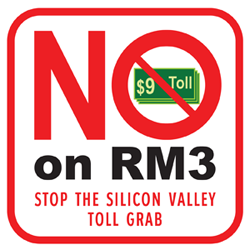No on Regional Measure 3
Vote NO on RM3. While transportation funding is important, excessive bridge tolls are not the way to do it.
Vote NO on RM3. While transportation funding is important, excessive bridge tolls are not the way to do it.
The better way is through value capture
via property or parcel taxes. New transit and highway infrastructure
adds value to the land near it. The RM3 campaign's top funders are
Silicon Valley venture capitalist John Doerr, the San Francisco
49ers, and the Sobrato Organization, a real estate company based in
Santa Clara County. Their property will
become more valuable as a result of RM3 investments, but they won't
have to pay for it.
RM3's burden would land on ordinary
commuters. Many who drive across the bridge can't switch to mass
transit, either because they need their car for work, or because
their job is located somewhere with poor transit service. Working
class service and industrial workers end up having to pay the bill.
By 2025, RM3 will raise tolls to $9 a trip, adding up to over $2000 a
year for someone crossing the bridge 5 times a week.
Even among commuters, RM3 is unfair.
15% of the benefits of RM3 will be in Santa Clara County, while Santa
Clara County residents – located at the southern tip of the bay and
able to get to most places without crossing a bridge - only pay 2% of
bridge tolls.
 |
| Source: MTC's Regional Measure 3 FAQ - https://mtc.ca.gov/sites/default/files/RM_3_FAQ_3-1-18.pdf |
While the Bay Area does need more
transportation infrastructure, RM3's regressive toll hike is the
wrong way to do it. Please vote NO on RM3, and ask your elected
officials to come back with better plans in November.
No on RM3 Facebook Group: https://www.facebook.com/groups/180169586103801/
Register to Vote at https://registertovote.ca.gov/
Remember to Vote by Mail or at the polls on June 5, 2018
No on RM3 Facebook Group: https://www.facebook.com/groups/180169586103801/
Register to Vote at https://registertovote.ca.gov/
Remember to Vote by Mail or at the polls on June 5, 2018



